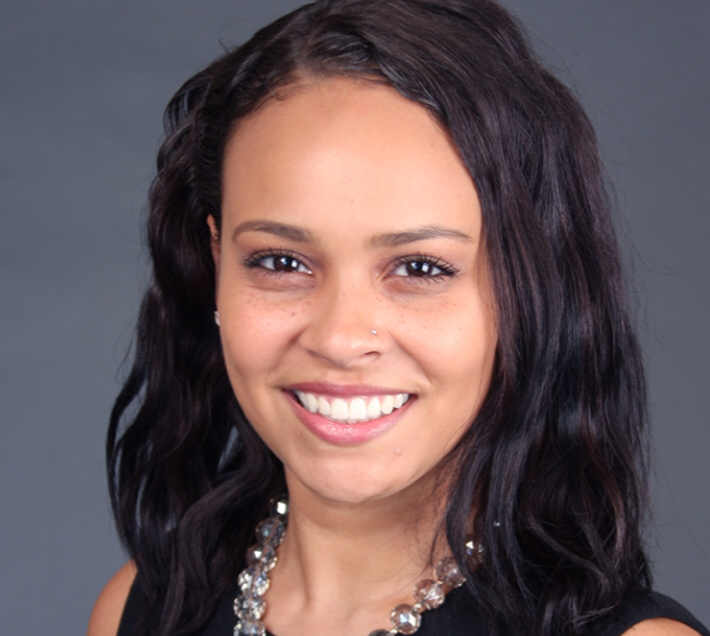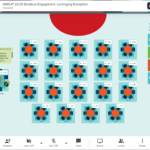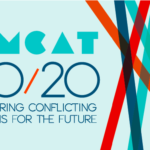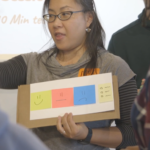WMCAT 20/20 Participant Reflection: Changing the Narrative On Racial Justice

By Ceara Easley
Ceara is a participant in the eight-month series, WMCAT 20/20: Exploring Conflicting Visions for the Future, hosted by the West Michigan Center for Arts + Technology (WMCAT). The May 13, 2021 Community Meeting featured keynote speaker Austin Channing Brown. This blog is a reflection on her presentation, “For only by being truthful about how we got here can we imagine a better way.” Learn more at wmcat2020.org.
I am honored to be writing the final WMCAT 20/20 Reflection. After eight months of building meaningful connections, we ended with a powerful keynote around changing the narrative on racial justice from Austin Channing Brown. Her words were beyond inspirational in helping me to identify themes and thoughts around avoiding racial battlefield fatigue in our community.
The first theme surrounds knowing where you are. This is salient for me having recently relocated my family to the south end of Grand Rapids in December 2020 after spending most of my life in Kalamazoo. My position working at the W.K. Kellogg Foundation allows me to challenge the systemic issues of addressing racial equity daily, but in many other organizations I have visited or interacted with, this is not the narrative. Austin described her experiences in similar positions and her discovering her purpose in other avenues, beyond the workplace. She began to use her voice and follow her heart in knowing what she wanted her community to look like. Austin found her strengths and used them to begin to change that narrative. When finding our communities’ strengths, everyone will need to learn what they bring to the table in self-reflection. For example, I know public speaking is not something I enjoy, but I thrive on timelines, deadlines, and structure which can help to keep the wheels moving for our community. This collaboration in community should focus on individual strengths striving to bring the marginalized voices in the Grand Rapids community to light.
As we collaborate as a Grand Rapids community, we must understand where the community currently stands. In being here around six months and learning much of what I know – beyond foundation work – from the local news station, I know for a fact that I do not have the answer on solving systematic racism in our area. WMCAT 20/20 recently held a discussion around social networks which brought into the open the fact that the answers are here in the community, but we have not heard all the necessary voices to take action. Without the collaboration of all, we are left within a siloed community, each of us performing our own work in a vacuum. Austin brought up great points around how we cannot control the process, but we can engage with each other to talk about racial justice. To figure out where the community is going will take more than one-on-one conversations with no action.
Do I know what is next? No. What I do know is WMCAT has set us up with a toolkit to reference and many amazing presenters on which we can reflect. This allows professionals to find the passion that ignites us so we can make changes towards a more equitable and inclusive community. WMCAT also called for future ideas on what is next in their series and I encourage those who know the community to reach out and provide that information. I do not know how, and I do not know when, but I am confident that as a community we have the resources and knowledge to begin steps toward creating a more equitable community for all.
ABOUT THE AUTHOR
Ceara Easley is a program specialist with the W.K. Kellogg Foundation in Battle Creek, Michigan. In this role, she supports the foundation’s efforts to promote thriving children, working families and equitable communities in the priority place of Grand Rapids.
Easley works with grantees and grantseekers, manages grant proposals, budgets and grant portfolios, oversees program operations contracts and manages administrative tasks.
Prior to this role, Easley served as a business development representative at Heritage Chevrolet in Battle Creek & Royal Chevrolet, Buick, and GMC in Coldwater. Prior to this, she was a graduate assistant at TRiO Student Success Programs, Office of Education Leadership and the Office of Pre-College Programming at Western Michigan University. Previously, she was an intern at The Center for Academic Success Programs; assistant teacher at Kalamazoo Symphony Orchestra; and a lead youth development worker for the Kalamazoo Kids in Tune.
Easley has a Master of Arts degree in organizational change leadership and a Bachelor of Science degree in general psychology and a minor in family life education from Western Michigan University (WMU) in Kalamazoo, MI. She also holds a Graduate Certificate in Higher Education and Student Affairs from WMU.






